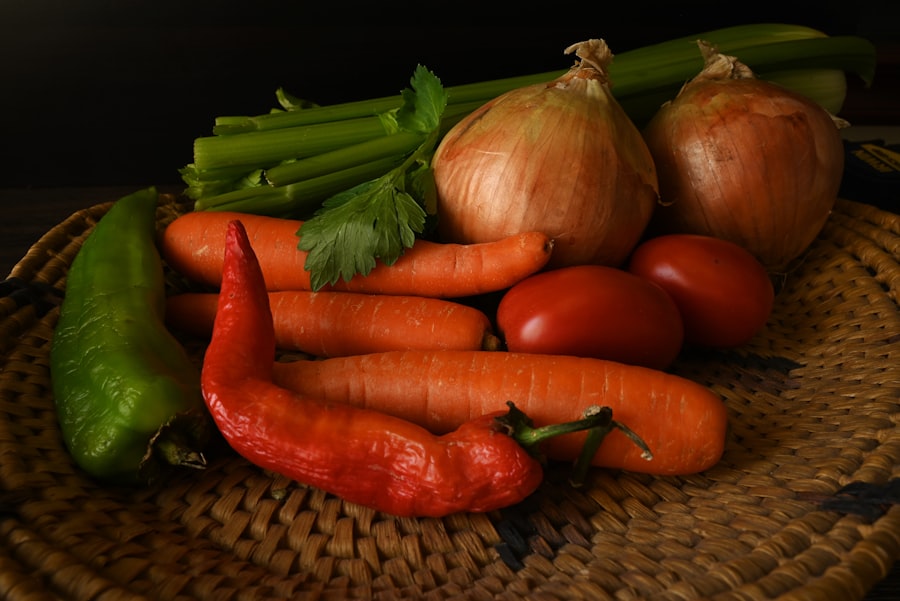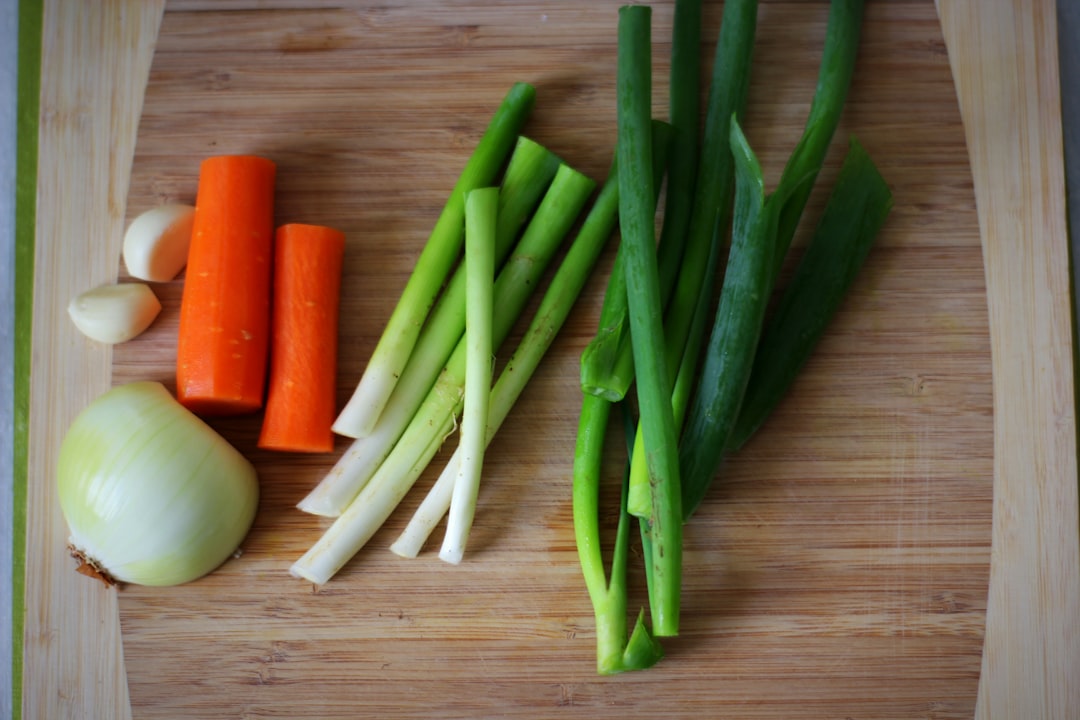As you age, maintaining your gut health becomes increasingly important. The gut is often referred to as the “second brain,” and for good reason. It plays a crucial role in digestion, nutrient absorption, and even mental well-being.
For individuals over 60, a healthy gut can significantly impact overall health, energy levels, and quality of life. As you navigate this stage of life, understanding the importance of gut health and how to support it through diet can empower you to make informed choices that benefit your well-being. The aging process can bring about changes in your digestive system, including a decrease in gut bacteria diversity and slower digestion.
These changes can lead to various issues such as bloating, constipation, and even more serious gastrointestinal disorders. However, by focusing on a diet rich in vegetables, you can help maintain a healthy gut microbiome and promote optimal digestive function. This article will explore the vital role that various vegetables play in supporting gut health for those over 60, providing you with practical insights to enhance your diet.
Key Takeaways
- Gut health is important for overall well-being, especially for individuals over 60.
- Veggies play a crucial role in maintaining gut health and supporting digestive function in older adults.
- Leafy greens are packed with gut-healthy nutrients like fiber, vitamins, and minerals.
- Cruciferous vegetables, such as broccoli and cauliflower, are essential for gut health due to their high fiber and antioxidant content.
- Incorporating a variety of veggies, including fermented, allium, bell peppers, and squash, can promote gut microbiome diversity and support digestive health in older adults.
Importance of Veggies in Maintaining Gut Health
Vegetables are a cornerstone of a healthy diet, particularly for older adults. They are packed with essential vitamins, minerals, and fiber that contribute to overall health and well-being. When it comes to gut health, the fiber found in vegetables is especially important.
This is crucial for maintaining a balanced microbiome, which can help prevent digestive issues and support immune function. In addition to fiber, vegetables are rich in antioxidants and phytochemicals that can reduce inflammation and oxidative stress in the body.
As you age, inflammation can become a significant concern, leading to various chronic diseases. By incorporating a variety of vegetables into your diet, you can help combat these effects and support your gut health. The diverse range of nutrients found in vegetables not only aids digestion but also enhances your overall vitality, making it essential to prioritize them in your meals.
Leafy Greens: The Powerhouse of Gut-Healthy Nutrients

Leafy greens are among the most nutrient-dense foods you can include in your diet. Varieties such as spinach, kale, and Swiss chard are loaded with vitamins A, C, and K, as well as minerals like calcium and magnesium. These nutrients play a vital role in maintaining the health of your gut lining and supporting digestive processes.
The high fiber content in leafy greens also promotes regular bowel movements, helping to prevent constipation—a common issue for many older adults. In addition to their nutritional benefits, leafy greens are also low in calories, making them an excellent choice for those looking to manage their weight. Incorporating these greens into your meals can be as simple as adding them to salads, smoothies, or stir-fries.
By doing so, you not only enhance the flavor of your dishes but also boost their nutritional value significantly. The versatility of leafy greens allows you to experiment with different recipes while reaping the benefits for your gut health.
Cruciferous Vegetables: A Must-Have for Gut Health
| Vegetable | Nutrient Content | Health Benefits |
|---|---|---|
| Kale | Vitamin K, Vitamin C, Fiber | Anti-inflammatory, supports digestion |
| Broccoli | Vitamin C, Vitamin K, Fiber | Supports detoxification, may reduce cancer risk |
| Cauliflower | Vitamin C, Vitamin K, Fiber | Anti-inflammatory, supports heart health |
| Cabbage | Vitamin C, Fiber, Sulforaphane | May reduce risk of certain cancers, supports gut health |
Cruciferous vegetables such as broccoli, cauliflower, Brussels sprouts, and cabbage are essential additions to your diet if you’re focused on gut health. These vegetables contain compounds known as glucosinolates, which have been shown to support liver function and detoxification processes in the body. This is particularly important for older adults, as efficient detoxification can help reduce the risk of chronic diseases.
Moreover, cruciferous vegetables are high in fiber and contain unique phytonutrients that promote the growth of beneficial gut bacteria. By including these vegetables in your meals, you can enhance your gut microbiome’s diversity and resilience. Whether you enjoy them roasted, steamed, or raw in salads, cruciferous vegetables offer a wealth of health benefits that can significantly improve your digestive health.
Root Vegetables: Supporting Digestive Health in Older Adults
Root vegetables like carrots, sweet potatoes, and beets are not only delicious but also incredibly beneficial for your digestive health. These veggies are rich in soluble fiber, which helps regulate bowel movements and maintain a healthy gut environment. Soluble fiber absorbs water and forms a gel-like substance in the intestines, aiding in digestion and preventing constipation—a common concern for many older adults.
Additionally, root vegetables are packed with vitamins and minerals that support overall health. For instance, sweet potatoes are an excellent source of beta-carotene, which is converted into vitamin A in the body and plays a crucial role in maintaining the integrity of the gut lining. By incorporating a variety of root vegetables into your meals—whether mashed, roasted, or added to soups—you can enjoy their flavors while reaping their numerous health benefits.
Fermented Veggies: A Probiotic Boost for Gut Health

Fermented vegetables such as sauerkraut, kimchi, and pickles are fantastic for enhancing gut health due to their probiotic content. Probiotics are live bacteria that provide numerous health benefits when consumed in adequate amounts. They help restore the balance of good bacteria in your gut, which can be disrupted by factors such as aging or antibiotic use.
Including fermented veggies in your diet can improve digestion and boost your immune system. Moreover, fermented vegetables are often rich in vitamins and minerals due to the fermentation process itself. This process not only enhances their nutritional profile but also makes them easier to digest.
You can enjoy fermented veggies as side dishes or incorporate them into salads and sandwiches for an added flavor kick. By making fermented vegetables a regular part of your diet, you can give your gut the probiotic boost it needs to thrive.
Allium Vegetables: Promoting Gut Microbiome Diversity
Allium vegetables like garlic, onions, leeks, and shallots are not only flavorful additions to your meals but also powerful allies for your gut health. These vegetables contain prebiotic fibers that nourish beneficial gut bacteria and promote microbiome diversity. A diverse microbiome is essential for optimal digestion and overall health, especially as you age.
Garlic, for example, has been shown to have antimicrobial properties that can help combat harmful bacteria while promoting the growth of beneficial ones. Incorporating allium vegetables into your cooking can enhance both the taste and nutritional value of your meals while supporting a healthy gut environment.
Bell Peppers: A Colorful Addition to Support Gut Health
Bell peppers are not only vibrant and visually appealing but also packed with nutrients that support gut health. They are an excellent source of vitamins A and C, both of which play crucial roles in maintaining a healthy immune system and supporting the integrity of the gut lining. The high water content in bell peppers also aids digestion by helping to keep things moving smoothly through your digestive tract.
Furthermore, bell peppers contain antioxidants that help reduce inflammation throughout the body. This is particularly important for older adults who may be more susceptible to inflammatory conditions. You can enjoy bell peppers raw in salads or cooked in stir-fries or stuffed with various fillings for a nutritious meal option.
Their versatility makes them an easy addition to any diet focused on promoting gut health.
Squash and Pumpkins: Nutrient-Rich Veggies for Digestive Health
Squash and pumpkins are not only delicious but also incredibly nutritious options for supporting digestive health. These vegetables are rich in fiber, which aids digestion by promoting regular bowel movements and preventing constipation—a common issue among older adults. Additionally, they contain vitamins A and C as well as potassium, all of which contribute to overall health.
The natural sweetness of squash and pumpkins makes them a delightful addition to both savory and sweet dishes. You can roast them as a side dish or blend them into soups for a comforting meal. Their high fiber content combined with their nutrient density makes them an excellent choice for anyone looking to enhance their gut health while enjoying flavorful meals.
Tips for Incorporating Gut-Healthy Veggies into the Diet
Incorporating gut-healthy vegetables into your diet doesn’t have to be overwhelming; it can be an enjoyable experience filled with creativity and exploration. Start by setting a goal to include at least one serving of vegetables at every meal. This could be as simple as adding spinach to your morning omelet or including a side salad with lunch or dinner.
Experimenting with different cooking methods can also make veggies more appealing. Roasting brings out natural sweetness while steaming preserves nutrients without adding extra fat or calories. Don’t hesitate to try new recipes or cuisines that highlight various vegetables—this will keep your meals exciting while ensuring you’re getting a wide range of nutrients essential for gut health.
The Role of Veggies in Supporting Gut Health in Older Adults
In conclusion, prioritizing vegetable intake is vital for maintaining gut health as you age. The diverse array of nutrients found in various vegetables supports digestion, boosts immunity, and promotes overall well-being. From leafy greens to root vegetables and fermented options, each type offers unique benefits that contribute to a healthy gut microbiome.
By making conscious choices to include more vegetables in your diet—whether through creative cooking methods or exploring new recipes—you can take significant steps toward enhancing your digestive health. Embracing this colorful array of foods not only nourishes your body but also enriches your life with flavor and vitality as you navigate this exciting stage of life.
As we age, maintaining a healthy gut becomes increasingly important, especially after the age of 60. Incorporating the right vegetables into your diet can significantly enhance gut health. Vegetables such as leafy greens, broccoli, and asparagus are rich in fiber and essential nutrients that support a healthy digestive system. For more detailed insights on the best vegetables for gut health after 60, you can explore this related article on Explore Senior Health. This resource provides valuable information on how to optimize your diet for better digestive health as you age.
Over 60? Ditch THIS Sneaky Veggie Wrecking Digestion, Bloating, and Microbiome Balance.
FAQs
What are the best vegetables for gut health after 60?
Some of the best vegetables for gut health after 60 include leafy greens like spinach and kale, cruciferous vegetables like broccoli and Brussels sprouts, as well as fermented vegetables like sauerkraut and kimchi.
Why are these vegetables beneficial for gut health after 60?
These vegetables are beneficial for gut health after 60 because they are rich in fiber, vitamins, minerals, and antioxidants, which can help support a healthy digestive system and promote the growth of beneficial gut bacteria.
How can these vegetables be incorporated into a diet for gut health after 60?
These vegetables can be incorporated into a diet for gut health after 60 by including them in salads, smoothies, stir-fries, soups, and as side dishes. They can also be fermented at home to create probiotic-rich foods.
Are there any vegetables that should be avoided for gut health after 60?
While everyone’s digestive system is different, some individuals may find that certain vegetables like onions, garlic, and peppers can be irritating to the gut. It’s important to pay attention to how your body responds to different vegetables and make adjustments accordingly.
Can supplements be used in place of these vegetables for gut health after 60?
While supplements can be beneficial for gut health, it’s generally recommended to obtain nutrients from whole foods whenever possible. However, if it’s difficult to consume a variety of vegetables, a high-quality probiotic supplement may be considered after consulting with a healthcare professional.
